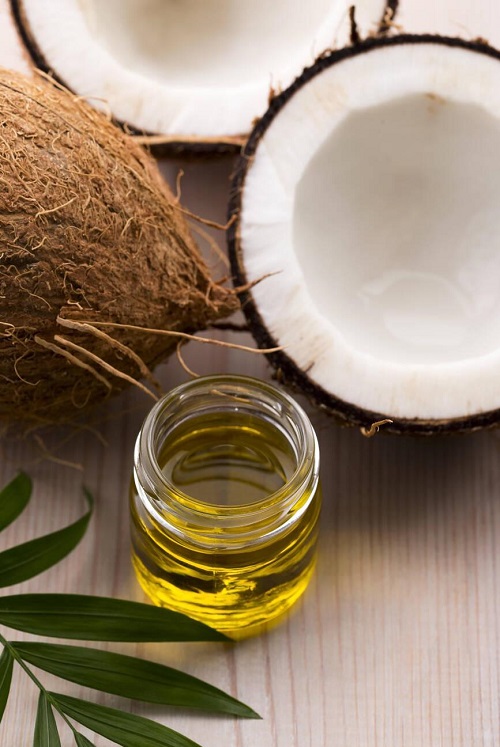Does coconut oil expire, or can it be a lifelong contender in your beauty regime? Learn about it in detail, with some scientific facts!
If you’re a fan of coconut oil, you’ve probably pondered over its shelf life at some point. Well, you’re in luck! In this guide, we have shared some essential insights about the longevity of coconut oil, ensuring you make the most of this versatile kitchen staple!
Does Castor Oil Expire? Click Here To Know!
What Is Coconut Oil?

Coconut oil is extracted from the kernel, meat, and milk of the coconut palm fruit, flaunting its versatility as an edible oil. It interestingly changes form based on temperature, turning into a solid white fat in cooler conditions while staying as a clear, thin liquid in warmer settings. Its unrefined version exudes a delightful, tropical scent.
Widely embraced in culinary circles, coconut oil is a favorite for frying and baking. However, its uses stretch beyond the kitchen and find its role in skin and hair care due to its moisturizing properties and potential antibacterial effects attributed to its fatty acid content.
Despite its high saturated fat content, some studies suggest that moderate consumption of coconut oil may have neutral or even beneficial effects on cholesterol levels and heart health.
Learn About The Uses And Benefits Of Coconut Oil Bath Here
Does Coconut Oil Expire?
Like all good things that eventually come to an end, coconut oil also has its expiration date. Its longevity is noteworthy, often outlasting other oils thanks to its high saturated fat content, which makes it less prone to oxidation. This feature grants coconut oil a relatively extended shelf life.
That said, it’s not invincible. Factors such as air, light, and heat can eventually degrade coconut oil, leading to rancidity. With proper storage away from these elements, coconut oil can remain usable for up to two years.
So it’s essential to store it properly to ensure you get the best out of your coconut oil while enjoying its numerous health benefits.
Does Tea Tree Oil Expire? Click Here To Know!
Refined vs. Virgin
Both types of coconut oil demand different storage needs. The shelf life of refined coconut oil is generally longer compared to virgin coconut oil. Let’s understand more in detail:
1. Refined Coconut Oil Shelf Life
Refined coconut oil has an extended shelf life due to its processing methods. Typically, it can last up to 18 to 24 months when stored correctly. The refining process involves steps like bleaching and deodorizing, which remove impurities and increase the oil’s stability.
2. Virgin Coconut Oil Shelf Life
On the other hand, virgin coconut oil, known for being minimally processed, has a somewhat shorter shelf life. Typically, it lasts about 12 to 18 months when stored properly. The minimal processing allows it to retain most of its natural flavor, aroma, and a higher concentration of antioxidants and beneficial compounds.
However, these very qualities, while advantageous for health, also make virgin coconut oil more prone to oxidation.
How Does Coconut Oil Go Bad?
- Heat and Light: Coconut oil spoils when its chemical structure changes due to exposure to light, heat, and air. These factors lead to the oxidation of fats in the oil, causing it to turn rancid.
- Oxidation Process: The tiny gremlins nibble away at the fatty acid chains in coconut oil. These chains break down, forming unstable compounds called free radicals.
- Contamination Alert: Once you crack open that glass jar of coconut oil, it’s exposed to all kinds of contamination—air, microbes, and kitchen shenanigans. These unwelcome guests can accelerate the spoilage process.
- Shelf Life: Coconut oil has a decent shelf life of around 2-3 years when stored properly. Keep it in an airtight container, away from direct sunlight, and in a cool spot.
Signs Of Coconut Oil Expiration
- Fresh coconut oil appears clear when liquid and solidifies into a milky white colour, while expired coconut oil may turn yellow. If you spot this hue change, it’s time to bid farewell.
- Spoiled coconut oil starts to get chunky or develops unknown substances floating in it.
- Black oil spots in your coconut oil container are a telltale sign of bad coconut oil. Mould contamination is tricky to gauge, so it’s best to discard the oil if you see those dark spots.
- Refined coconut oil has a neutral scent—no coconut perfume here. Virgin coconut oil, on the other hand, carries a subtle, sweet coconut aroma. If your oil smells sour or bitter, it’s best to avoid using such oils.
- Good coconut oil usually has a subtle, natural taste. But if it suddenly tastes bitter, it’s time to part ways.
How To Make Coconut Oil Last longer?
- Tightly close the coconut oil container after each use. Prevent air and light from sneaking in like uninvited guests. A snug cap keeps oxidation at bay, ensuring your oil stays fresh and fabulous.
- Direct sunlight accelerates oxidation. Store your precious oil in a dark, dry place to preserve it’s benefits.
- Coconut oil has a long shelf life, but it can eventually spoil. Refrigerating your oil within the recommended timeframe can help maintain its quality and nutritional value. Cold temperatures slow down the ageing process.
- Heat speeds up the breakdown of fatty acids. Keep your oil away from stovetops, ovens, and saunas.
- Use dry, clean spoons or scoops to avoid introducing moisture. Remember, coconut oil doesn’t appreciate germs or bacteria either. So, you need to keep it pristine.
Is It Safe To Use Expired Coconut Oil?
Yes, it is generally safe for external use. Coconut oil has an impressive shelf life, often outlasting its expiration date. As long as it doesn’t smell sour or taste off, you’re good to go. However, if mold creeps in or it turns chunky, it’s time to bid farewell.
Do remember that consuming expired coconut oil may pose health risks due to potential oxidation, which can lead to the formation of harmful compounds. These compounds may contribute to oxidative stress in the body, increasing the risk of chronic diseases. Always check the oil for any signs of spoilage before use, and exercise caution when consuming expired coconut oil. When in doubt, it’s best to discard expired coconut oil to avoid potential health hazards.


